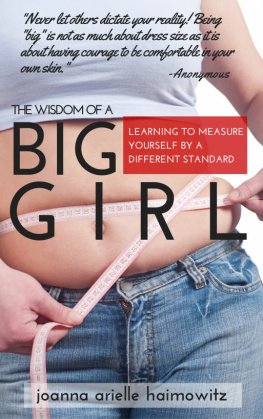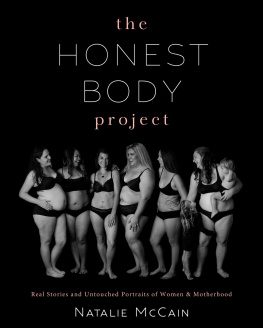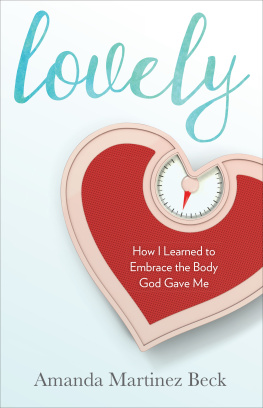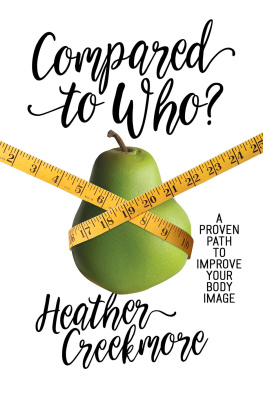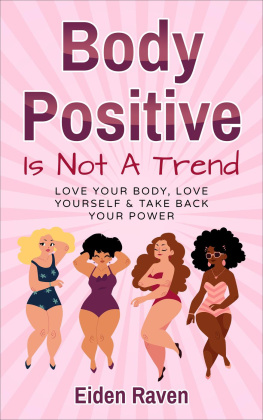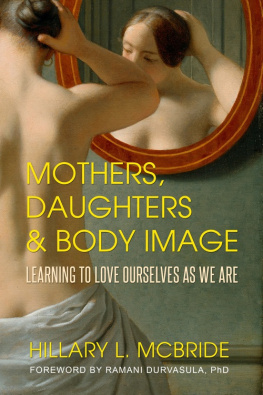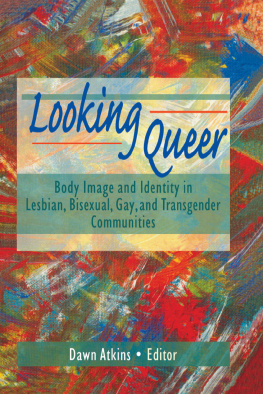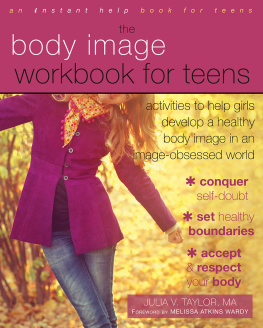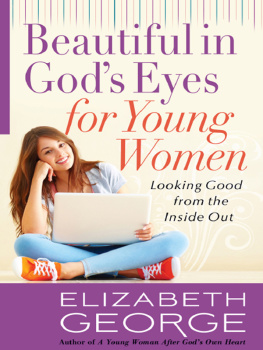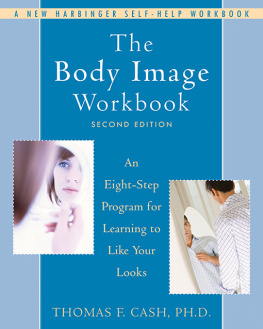Copyright 2015 by L. David Harris
The Wisdom of a Big Girl: Learning to MeasureYourself by a Different Standard (rev. 3)
by Joanna Arielle Haimowitz
All rights reserved solely by the author. Theauthor guarantees all contents are original and do not infringeupon the legal rights of any other person or work. No part of thispublication may be reproduced or transmitted in any form or by anymeans without written permission by the author.
Table of Contents
Introduction
Just last night, while watching a rerun onTV, I was subjected to a two minute commercial about crepe and anew product that claims to get rid of all those pieces of hangingskin (or so I assumed from the pictures). I didnt even know whatcrepe was until I saw this commercial, but apparently, it is thestretching and wrinkling of the skin along the neck, arms, andchest. And with the product they were peddling, I could reduce thewrinkles on my skin and look twenty years younger!
During the same show (so within an hour), Isaw an ad for a girdle that gives women the hourglass shape thatthey are supposed to have. The idea behind it is that you canhave the hourglass shape without any dieting or exercise! But I canonly imagine the discomfort that is endured when one wearssomething so tight around their waist that moving seems almostimpossible.
This is just a couple examples of a millioncommercials aimed at women that tell us to look younger, thinner,and more beautiful. After all, the entire purpose of the female sexis to be pretty. At least thats what I can figure from watchingcable television. That also seems to be what is taught throughalmost all mass media outlets.
All women have been subjected to thispervasive idea that we have to look a certain way, have young,beautiful skin, show no blemishes, and be thin and attractive. Andif we do not fit into this stereotype of what society thinks isbeautiful, then we are shunned, teased, degraded, or evenostracized. It has been proven that people who are considered moreattractive get better jobs, have more friends, and are treatedbetter in society as a whole. Is it no wonder then, with all thesemessages coming at us from all directions, that body image is aproblem for all women? After all, we all want the best in life, nomatter our weight or what we look like, so we do our best tomeasure up.
I am not free from the subtle and not sosubtle suggestions that the way I am is not acceptable, and that Ishould spend a great deal of money on products such as make-up,clothing, hair styling products, and even plastic surgery such asliposuction and breast implants, to look a certain way. It can bedifficult for women, who have grown up being told to be beautiful,to smile, to dress pretty, to get away from the barrage of messagesthat tell us how to look. And if we fail to achieve these standards(which almost everyone fails to reach these standards), ourfeelings about ourselves drop into the basement. We look ourselvesin the mirror and hate what we see, or we avoid mirrors completely.We dont believe it when people tell us we look good because wehave been told for so long that we arent good enough. We spendthousands of dollars on products and services that will help us fitthis image, we yo-yo diet and starve ourselves to make a certainweight, and we hate ourselves when we fail.
But there is a better way. You can learn tolove yourself and accept who you are. Thats what this book is allabout. Read on and you will learn how to improve your body imageand discover that there is a lot to love inside your skin. Trustthat you are beautiful, without all these products. This book willshow you how.
In the first chapter, I will give you amessage about how the world works and help remind you that you are,in fact, a beautiful person, no matter what you see in the mirror.The second chapter will give a full description of body image,where it comes from, and how it affects the lives of every woman.After that, each chapter will discuss different ways to improve howyou feel about yourself and your body and help you become morecomfortable in your skin. Subjects touched upon include changingthe negative messages we tell ourselves, using encouragingthoughts, surrounding ourselves with positive, uplifting people,using a journal to explore our feelings about our bodies, andfocusing on living a healthy lifestyle, instead of worrying aboutthe number on the scale or exactly how we look in a mirror.
The hope is that, when you have completed thedifferent exercises in this book, you will feel better aboutyourself and feel more comfortable in your skin. Some of theseexercises may work better for you than others. After all, everyoneresponds differently to different methods, and you can experimentto find the ones that work best for you. Make sure you spend sometime every day working on improving your body image. Its worthtaking time to feel better about yourself. You deserve the best.You deserve to feel beautiful, no matter your weight or otherfeatures.
A Personal Note to Readers
Before you read this book, I want you to knowwhere I am coming from. Since childhood, I, too, have faced themessages that come from all around. As a tom boy, people often toldme that no boy will like me if I dont dress prettier, if I dontwear make-up, and if I dont smile more often. My mother tried toforce me to wear dresses when I wanted to play basketball. Shetried to show me how to wear make-up and even got mad at me when Iwent on my first real date without it. I read the magazines teengirls read, encouraging me to dress a certain way, to lose weight,and to try to be more like the picture perfect images in thosebeauty magazines.
The first time I remember thinking I neededto lose weight, I was ten years old and entering the fifth grade. Iweighed 72 pounds. I was fit and active, but I still believed thatI was too big. I dont even know where that message came from. Afriend and I talked about weight and how we needed to lose some. Iwas of normal weight, and my friend was probably underweight, yetwe were both worried about the number on the scale. At age 10 Ithink it had just been around me all my life, and I was firstindoctrinated into the world of being a pretty woman.
It wasnt until much later that I learnedthat those pictures I saw in magazines were airbrushed. They weretouched up so the women had perkier breasts, thinner thighs andtucked tummies. Then images we see in front of us every day, theones that we hold up as the pillars of beautiful women, arent evenreal. But no one really talks about that. Instead, we see them,alongside ads for plastic surgery, make-up, and every weight lossmethod under the sun to make you look thin, bright, and to cover upevery blemish on your face.
Almost every woman in TV shows and in themovies are thin, young, and beautiful. Youth is extolled as thething to aim for, although we all grow old.
The funny thing is, as Ive grown older, Ivelearned to spot the fallacies in their logic. I have learned that Idont need to look or dress a certain way to be loved. I dont needplastic surgery to appear beautiful to my husband. I have learnedthat what is inside is much more important than what is on theoutside. I learned that I dont need to spend thousands of dollarson make-up to make my face presentable to others. I have learnedthat if people cannot accept me for who I am, they dont deserveme. I have learned to love myself, even though I have love handlesand freckles and am starting to see a few gray hairs andwrinkles.
It may not be easy to get to this point ofcomfort with yourself, but you deserve to. The only way to breakthe cultural stereotypes is to refuse to believe in them. The morewomen who choose to love themselves exactly as they are, the lesswe will be bound by these unrealistic standards that we see in theworld around us and the less we will pass on these problems to ourdaughters.
Next page
